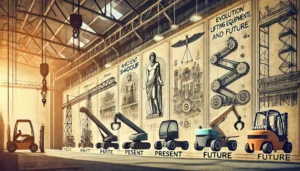Now, companies prioritize efficiency, flexibility, and accuracy more than ever before thanks to the evolution of industries. A common issue among businesses across various sectors is their inability to capture the root of these matters because of their dependency on overly complicated solutions. As a remedy, self-service tailored solutions developed to keep every sector’s unique operational characteristics in mind have surfaced. These solutions strive to enhance productivity and efficiency across the board.
Understanding Tailored Solutions In Industrial Contexts
In simple words, tailored solutions are strategies, tools, or systems customized for a specific operational aspect in an industrial environment. Unlike one-size-fits-all approaches, these solutions consider the specific nuances of an organization and examine the workflow, equipment, and set objectives. By aligning closely with these factors, tailored solutions are capable of optimizing performance and successfully addressing challenges which standard methods cannot manage.
Enhancing Efficiency Through Customization
The enhancements provided by these systems automatically solves the common issue of operational efficiency faced by millions of organizations. Custom process and system designs that are made to fit the requirements of an organization leads to less redundant work, less waste, and decreased silos. With the changes in production systems, not only will the production rates increase but the material handling will also drop to an unprecedented low – further assisting the company’s bottom line. Improved synchronization among departments cannot only help tailor the workflow but also reduce delays while ensuring that every function operates at max output.
Improving Quality and Consistency
Industries are able to meet new level standards by meticulously setting process parameters and control measures. A carefully crafted process design facilitates every step of the process, increases uniformity, and bolsters the product’s quality further decreasing variability. This strategy helps in areas such as aerospace and pharmaceuticals, where accuracy and dependability are vital. Industries can enhance the level of quality achieved in control manufacturing while complying with regulatory laws and satisfying customer needs by tailoring quality control mechanisms.
Cost Reduction and Resource Optimization
Even though the first outlay in tailored solutions tends to be higher than the initial one, the long-term expense should be lower. Custom-designed processes tend to lower operational expenditure because of improved energy use, lower maintenance needs, and waste of resources. Downtime, equipment wear, and material losses during optimized production lines are minimized. In addition, expenditure on unnecessary items is reduced through process automation and workflow customization. In doing so, resources are ensured to be fully utilised and maximized.
The ability to adapt to Changes Related to Industry
The uniqueness of certain industries unveils certain challenges that a generic approach will not cover. Custom-made solutions ensure that strategies, plans, and approaches work according to the industry’s strengths, weaknesses, and trends because they relate to a given sector. Every industry like automobile, pharmaceuticals, or heavy machinery has a factory and assembly line quite literally tailored for them, solving their problems in the most reliable way while ensuring business continuity.
Integration of Advanced Technologies
The use of advanced technologies like AI, machine learning, and IoT in custom-made solutions improve process efficiency immensely. Industrial prediction AI automates and ensures that any potential obstacles on the way are solved without the client actively participating in the process. Industrial-grade smart sensors give you live sensor data, enabling ML dull-time prediction maintenance instead of calendar maintenance so as to reduce downtime. Setting a baseline and changing the setting further improves efficiency by eliminating unnecessary and monotonous tasks. Identifying the area for improvement and automating these tasks aids in boosting overall productivity.
Case Studies Demonstrating the Impact of Tailored Solutions
Custom-tailored solutions have changed the way many industries operate, as witnessed with process automation:
- Manufacturing: One custom-tailored process automation solution for a production company focuses on workflow automation. As a result, production processes are much more efficient and cost-effective. Maximizing output without incurring further expenditure reduces production errors and increases worker safety across the board.
- Aerospace: The company implemented custom materials management and production planning software, allowing for effortless inter-departmental collaboration. This resulted in parts assembly accuracy, decreased waste, and higher profitability.
- Pharmaceuticals: The company designed a unique packaging and labeling system that strictly adhered to international regulations. This minimized distribution mistakes and increased product traceability throughout different markets.
Implementing Tailored Solutions: A Strategic Approach
In order to efficiently develop effective tailored solutions, organizations ought to consider the following strategic plan:
- Assessment of Current Processes: Perform a detailed review and analysis of current processes, workflows, and systems in place to detect inefficiency and malfunctioning areas.
- Collaboration with Experts: Consult with relevant industry professionals or process consultants that specialize in process improvement to formulate the proper strategy.
- Integration of Technology: Implement modern technology to improve the efficiency and flexibility of processes.
- Continuous Monitoring and Improvement: Set parameters to evaluate the working efficiency of the employed solutions for further improvements on the techniques and strategies employed.
- Employee Training and Involvement: Adopting new tailor made solutions requires employees to understand the need for it and accept it, which makes training programs that equip workers with the right skills and knowledge to operate custom systems very important as it promotes a smoother transition and high adoption.
Future of Tailored Solutions in Industrial Processes
The future will see tailoring being more central in industrial processes. Like all things in life, the use of crafted solutions will always increase. Focus will also be concentrated on the further adoption of Ai and monitoring and data analyzing tools. Tailored solutions will also allow companies to easily scale, and waste to be reduced to the lowest possible level while effectively maximising resource use.
Additionally, custom solutions will also focus on the need for industries to go green. There will be a shift in industries that will make sustainability an important feature when crafting the solutions. This will make it possible for companies to go green while still making profits. Improvements in the integrative use of renewable energy, optimising waste management and intelligent supply chain systems will become core functions of industrial operations.
Conclusion
Development in the tailoring of the solutions to industrial processes is going to take crafting logistics, production and manufacturing efficiency to a whole new level. There are so many factors that are at play for tailored crafted industrial processes to take center stage in an increasingly data led and smart technology world. Tailored solutions address key concerns and provide crafted methods for solving processes. It is a special approach that crafts how industrial operations are done today. By embracing these solutions, industries can achieve enhanced efficiency, improve quality and more importantly save a lot of money while enjoying sustained success in a competitive market.










